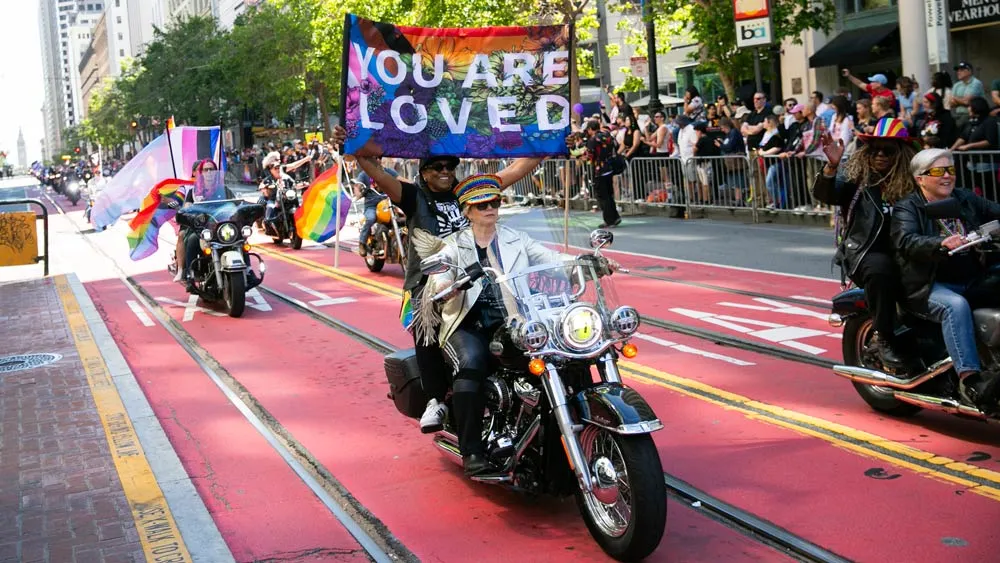September 24, 2013
Supes Hear of Frustration with SF Pride Officials
Kilian Melloy READ TIME: 5 MIN.
A San Francisco Board of Supervisors committee discussed the problems with the San Francisco LGBT Pride Celebration Committee for three hours last week, learning that some recommendations in a 2010 controller's report have never been implemented.
Gay Supervisor David Campos called the special meeting of the Neighborhood Services and Safety Committee to review San Francisco Pride's governance and organizational structure, financial standing, and to hear public comment from community members and vendors frustrated for months by inaction and controversy at the organization. Supervisors Norman Yee and Scott Wiener also attended.
In 2010 former Supervisor Bevan Dufty and Campos had the city controller's office audit SF Pride. Its finding was that the organization had "both financial and governance shortcomings."
SF Pride's financial shortcomings appear to have been successfully addressed by the organization, Campos said after hearing testimony from Pride board President Davace Chin, who told the panel that Pride had $100,000 in cash reserves and had paid off all debts. Chin will leave the Pride board September 30.
In addition to Chin, interim CEO Lisa Williams attended the hearing, as did board member Shaun Haines and interim attorney Julius Turman.
Three years ago, SF Pride was cited with not filling the 15 maximum allowable seats on its board, inconsistent methodology, outdated and undocumented vendor contracts, and noncompliance with citywide nonprofit monitoring standards.
Before questioning Chin, Campos noted the recent departure of Pride CEO Earl Plante, without mentioning him by name. He said it might be necessary to hold an additional meeting in coming weeks.
When Chin told Campos he had only a three-day notice to prepare for the hearing, Campos said he called Plante "weeks ago" about the hearing and his staff never got a response.
Campos expressed dismay at SF Pride's turnover of chief executives. Chin noted the board stability while acknowledging the leadership turnover.
Prior to Plante, Brendan Behan ran Pride for the 2011 and 2012 events but his contract was not renewed last year. Prior to Behan, who had worked as a deputy director at Pride for several years, Amy Andre was hired for the 2010 event. She resigned before the end of that year.
Under questioning, Chin could not explain why the board is not staffed with 15 members as the city recommended. He told the supervisors once the new board members were elected, they could appoint others as needed.
Chin did not offer details on SF Pride's financial situation and treasurer David Currie was absent. Chin told Campos SF Pride made $175,000 in grants to community partners this year.
In his 900-word exit letter, Plante said SF Pride made $200,000 in community grants. At the September SF Pride board meeting, then-board President Williams announced it was $176,000. (Williams took over as interim CEO following Plante's departure.)
Chin could not answer questions from Campos on the current state of SF Pride's bylaws and why it cannot locate them. He suggested another absent unnamed board member might be in a better position to answer bylaw questions at a future meeting.
Yee asked Chin for the date of the last SF Pride audit. Chin stated an audit was conducted in 2011-12 and he agreed to supply Yee a copy. In further questioning, Chin was unaware if SF Pride had done any analysis on past CEO turnovers. Yee suggested it would be "useful" to do this.
When Campos invited Williams to speak, she mentioned SF Pride's improved financial situation and said the board would "likely" add more members after the election. She said consultants have talked with board members about governance and she felt the board was headed in the right direction. She thanked vendors in attendance for their role in making Pride a success.
Public Comments
During public comment, vendors and members expressed longstanding frustrations with SF Pride and many mentioned the Chelsea Manning controversy.
After initially naming Manning as a grand marshal in late April, the Pride board reversed itself two days later. Initially Williams, in a statement, said that it was a "mistake" to name Manning a grand marshal. Later, the board came out with a second statement that said Manning couldn't be considered for a community grand marshal slot because she is not local. Manning was convicted last month of leaking classified government documents to WikiLeaks and sentenced to 35 years in prison.
Audrey Joseph said SF Pride's staff was not well managed and it hurt her work as a contractor and main stage producer. Parade manager Marsha Levine said she had been with SF Pride for nearly three decades and considered leaving but is "open to staying now" with the "difficult" CEO gone. Levine also ran for a seat on the Pride board and was among the top vote-getters in the September 15 election, which is still disputed.
Former beverage manager Andy Copperhall said, "SF Pride is in turmoil" and has "lost its vision, focus, and drive." He said the much smaller Folsom Street Festival gives twice as much to community partners as does SF Pride.
He said SF Pride was managed by "self-serving individuals who attack their community." He called Pride "a multi-million dollar generator for the city" and its management was "reprehensible."
Copperhall, who was a contractor from 2001-2012, ended his blistering remarks by saying, "SF Pride was the laughingstock of all Pride events in the country."
Former SF Pride attorney Brooke Oliver commended Williams for "reconstructing" SF Pride. She said the organization was like "the Golden Gate Bridge, an institution."
"San Francisco has never done an economic impact study of SF Pride for the city," Oliver said. She suggested if such an analysis were done it would show "$500 million to $800 million in economic activity to the city over a three-year period."
If this economic impact were known, Oliver said, the city would be more supportive of SF Pride. Campos agreed but stopped short of pledging an economic impact study.
San Francisco Veterans Affairs Commissioner John Caldera angrily blasted Plante for stating in his letter that "racist politics of personal destruction" were behind his decision to resign.
"When was the last time there was a Latino on the SF Pride board of directors?" Caldera, also a top vote-getter in the board election, asked.
Thomas Plagemann said Plante was "arrogant" and there was "no justification" for Plante's statement about "racist politics." He said he "expected him to bring [race] up due to the specious assault charge."
At a May 7 SF Pride board meeting, Plante claimed an unknown assailant, angered over the Manning controversy, assaulted him. No charges were filed. He later accused a board candidate of assaulting him and it was that email, sent from his work account, that apparently led to his forced resignation. The candidate, Jesse Oliver Sanford, was among the top vote-getters in Sunday's election.
Pat Keenan, a "mostly retired" doctor of Chinese medicine from the East Bay, said Pride began due to oppression and when Manning was oppressed, SF Pride should have supported her.
At the end of comments, Campos called Chin back to the podium. Chin said he was concerned over the comments and he would share his notes with his SF Pride colleagues.
Williams was not called back as she had left early.
Campos, directing his comments to Chin, noted SF Pride's frequent excuse for inaction on multiple matters, according to public comments, was "short staff" and "not enough volunteers."
"More board members means you can do more work so you need more members," he told Chin.
Kilian Melloy serves as EDGE Media Network's Associate Arts Editor and Staff Contributor. His professional memberships include the National Lesbian & Gay Journalists Association, the Boston Online Film Critics Association, The Gay and Lesbian Entertainment Critics Association, and the Boston Theater Critics Association's Elliot Norton Awards Committee.







